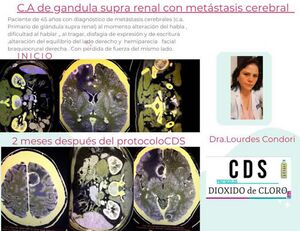Suprarenal cancer with brain metastasis
Dra. Lourdes Condori
Suprarenal cancer with brain metastasis

Medical Remark on Chlorine Dioxide (CDS) Efficacy in Oncologic Treatment
Patient Case Overview: A 45-year-old patient diagnosed with suprarenal cancer exhibiting brain metastasis has undergone treatment with chlorine dioxide (CDS) for a duration of two months. During this period, a notable and unexpected reduction in tumor size has been observed.
Clinical Observations:
- Tumor Reduction: The patient demonstrates a clear reduction in tumor mass, indicating a potential therapeutic efficacy of CDS in the management of advanced malignancies.
- Adverse Effects: Importantly, the treatment has been well-tolerated, with no reported adverse effects, which is a significant consideration in oncologic therapies that often come with considerable side effects.
Discussion: The results from this patient case suggest that CDS may provide a novel approach in the treatment of cancer, particularly for patients who have limited options due to advanced disease and associated complications. The absence of adverse effects enhances its attractiveness as a potential adjunct therapy in oncological protocols.
Conclusion: This case opens new avenues for further research into the role of chlorine dioxide in oncology. Controlled studies are warranted to validate the findings and explore the mechanisms behind the observed tumor regression. As the medical community seeks innovative solutions for complex cancer cases, CDS could represent a promising alternative or complementary treatment strategy.
